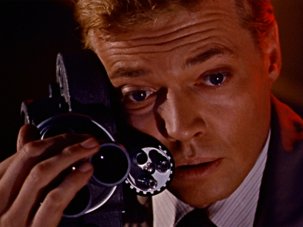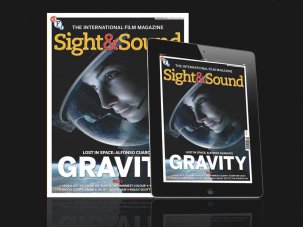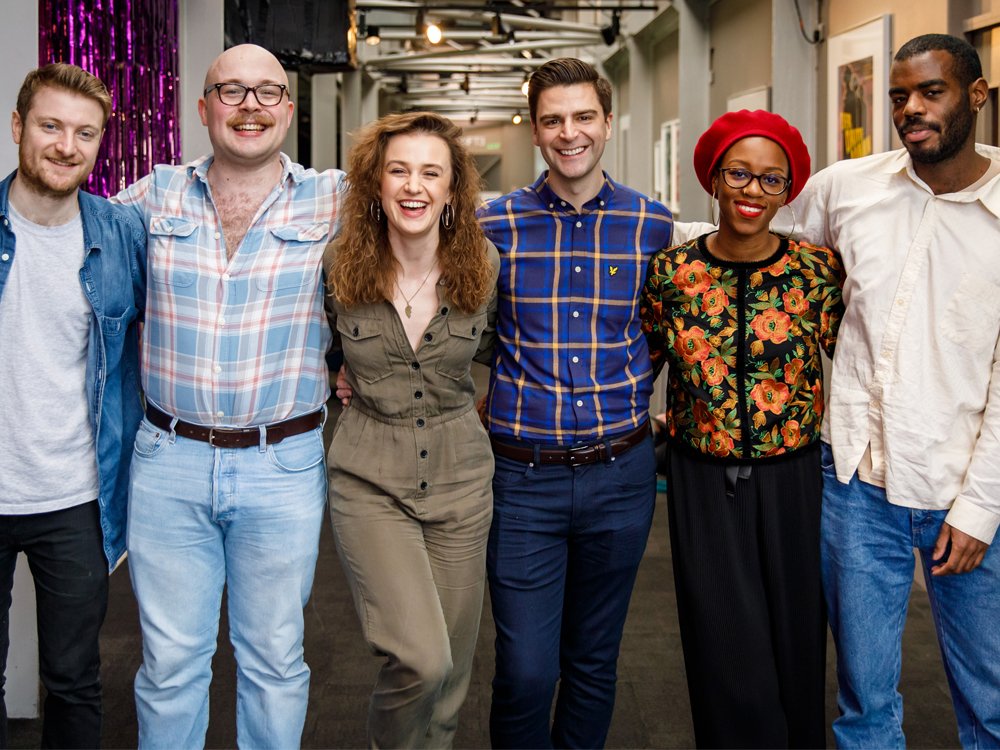
Left to right: Rhys Marc Jones, Edward Cripps, April Kelley, Garry Paton, Abena Taylor-Smith and Stephen Isaac-Wilson
Credit: Tim Francis
Now in its fifth year, the BFI Flare mentorships are a partnership between BFI NETWORK, BFI Flare, and BAFTA. The programme brings together a group of emerging LGBTQ+ filmmakers to receive: mentoring by a senior figure from the film industry, a bespoke programme of events and roundtables during BFI Flare: London LGBTQ+ Film Festival and throughout the year, professional connections, and an overview of LGBTQ+ features entering the marketplace.
Selected through an open submission process, applications received in 2019 show the breadth of LGBTQ+ filmmaking voices in the UK. We are pleased to announce the six exciting new producers, writers, and directors working across genres and disciplines, who will join a growing alumni of filmmakers supported by the programme over the last four years.
2017 mentee Amrou Al-Kadhi wrote about their experience on the programme.
Meet the filmmakers who have been selected for this year’s BFI NETWORK @ FLARE Mentorships in partnership with BAFTA.
Abena Taylor-Smith (writer-director)
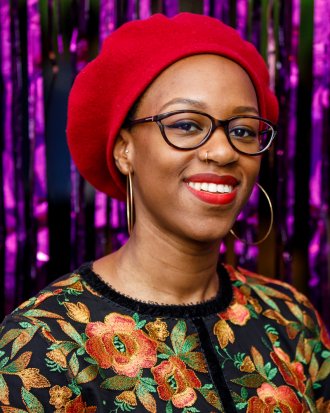
Abena Taylor-Smith is a writer and director. She studied Biomedical Science at Imperial College London. Her short film, Ladies Day, was supported by ShortFLIX, the talent development scheme run in partnership by Creative England, Sky Arts and the National Youth Theatre. Ladies Day has screened at festivals in the UK and internationally including BFI Flare, Encounters, Raindance and Leeds International Film Festival; it was shortlisted for Best British Short at the BAFTA-qualifying Iris Prize Film Festival and Best Narrative Short at the Pan African Film Festival in LA. It has also been selected as one of this year’s #FiveFilms4Freedom. Her next short is in pre-production and she has been awarded funding by the NFTS as part of their Diverse Directors Workshop 2019 supported by Disney Motion Pictures UK.
Abena on challenges and opportunities for LGBTQ+ filmmakers:
I think every generation has their underground queer arts circuit and a select few artists who go on to become household names; but within a few generations, most of the collective knowledge about these movements and networks can be lost. This is often a result of minimal documentation within queer communities due to the risk of persecution as well as wilful erasure and suppression by mainstream society. As a result, younger generations are left wondering what came before and whether or not they are the first to achieve a given milestone. There’s a tension between the need for younger people to research, listen and learn, but also for older people to share without judgement.
Abena on an admired filmmaker:
I love Debra Granik’s narrative features, Down to the Bone (2004), Winters Bone (2010) and Leave No Trace (2018). She uses social realism to find the extraordinary in everyday life. The fact that she is a writer-director (she co-writes with Anne Rosselini) comes through in her confidence in the power of the narrative and characters to grip the audience. Her protagonists are often young, poor women from small towns, relying on themselves and their wits to survive. They are complex, resourceful and their only viable option is to out-smart their problems. I find that really inspiring.
April Kelley (producer)
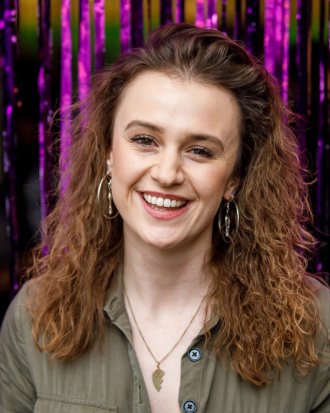
April is an award-winning actor and producer. Adamant that something within the entertainment industry would support her acting career she created Mini Productions in her second year at drama school. April starred in Mini Productions’ Annie Waits which screened at 70+ festivals worldwide; including BAFTA-qualifying Underwire and London Short Film Festival and Oscar-qualifying St. Louis International Film Festival. Other producing credits include, Christian Cooke’s directorial debut, Edith starring Peter Mullan (Trainspotting) and Michelle Fairley (Game of Thrones). Siobhan Schwartzberg’s Not the Devil, which premiered at BFI Flare in 2017 and Matt Kennard’s WWI, Hymn of Hate starring Russell Tovey (The Pass) and Thomas Turgoose (This is England). She’s just wrapped on Mini Productions debut feature, Rose starring Matt Stokoe (Jamestown) and Sophie Rundle (Peaky Blinders) — a dark, Gothic exploration of one couple’s relationship. Her writing debut, Treacle, which she also stars in and produces will premiere at this year’s BFI Flare. She is currently developing Treacle into a television series as well as her second film which will focus on the two bis – bisexuality and bipolar.
April on challenges and opportunities for LGBTQ+ filmmakers:
Personally, I believe that the majority of the challenges we face would be resolved by more education and as a result; visibility. It certainly would have helped me accepting my sexuality quicker. With visibility comes understanding, over the last year I’ve noticed a difference within my circles; for example, my Mum recently asked me if there was a ‘man or woman’ tickling my fancy. Trust me, this is a huge breakthrough. We need to make sure that content being created is supported by a variety of people who are well equipped to tell varied stories. These opportunities are now happening, slowly but surely, but it’s worth remembering and asking; how are we supposed to tell LGBTQ+ stories unless we have LBGTQ+ people driving the content from behind the camera? I do hope that one day we’ll live in a world where the ‘minority’ doesn’t need to live separately from the ‘mainstream’… I hope that people of all genders and sexual orientation can watch LGBTQ+ content and be able to relate to it.
April on an admired filmmaker:
Bold, brave and unapologetic, Desiree Akhavan is everything I admire in a person and everything I hope to be as a filmmaker. Until Appropriate Behaviour came out in 2014, I was yet to see authentic bisexuality represented in film and for someone like myself, who wasn’t sure at the time if bisexuality was a way of life or a Segway into lesbianism – this was monumental for me as a person and filmmaker. To then see Desiree go on and create The Bisexual was a solidarity punch to the air. A series which showed the bravery of someone who let their characters and actors (including herself) sit in silence but, equally, providing them with quick-witted, complex dialogue. One thing which drives me in this industry is to tell stories which are so relatable that others don’t feel alone – this is what Desiree does for me.
Edward Cripps (writer)
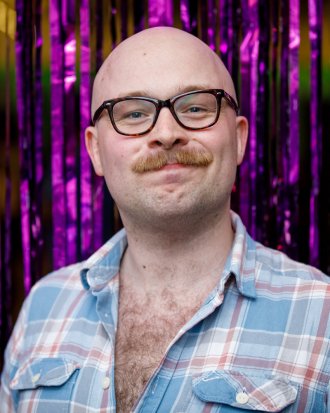
Edward is a London-based writer by way of Yorkshire and Dorset and was one of seventeen boundary-pushing filmmakers selected for the 2018 NETWORK@LFF programme. His first TV pilot, Tough Love, a thriller about correctional teen boot camps, is in development with Leopard Pictures and he is adapting two novels for 198 Films, supported by Creative Europe. Edward co-wrote the SEFF and Film London short Between the Devil and the Deep Blue Sea and has upcoming shorts on LGBTQ+ youth homelessness with director Jason Bradbury and producers Yaw Basoah and Brett Webb, and on the joy of queer desire with Watersmeet Productions. Edward is a BFI Network x BAFTA Crew participant and was selected for an IdeasTap BBC Writersroom masterclass for his first screenplay. His background in script development includes working on the BAFTA nominated short The Party and an internship at Number 9 Films. Edward is developing a slate of feature, TV and short film projects with a focus on unconventional genre and LGBTQ+ stories. He is represented by Giles Smart at United Agents.
Edward on challenges and opportunities for LGBTQ+ filmmakers:
In some people’s eyes, an LGBTQ+ protagonist can automatically label a project as ‘niche’, no matter the wider themes. LGBTQ+ filmmakers have to work even harder to climb the ladder or hit the mainstream, even at a time when it’s clear that underrepresented audiences are hungry for stories. These assumptions can also play into the kind of stories that tend to be told. I love grounded drama, coming of age stories and literary adaptations, but I’m also so excited to see more queer perspectives in genre storytelling. Growing up gay led me to question everything; myself, prejudice, authority, gender norms, why things supposedly couldn’t be done a different way. I think that questioning can be an ace tool as a writer. LGBTQ+ filmmakers should feel able to embrace their questioning and their difference to tell bold, ambitious stories. It’s only by being specific and honest that we can fully interrogate universal human truths.
Edward on an admired filmmaker:
Ari Aster’s Hereditary, Lynne Ramsay’s You Were Never Really Here and Ali Abbasi and Isabella Eklöf’s Border have been amazing recent touchstones, but I was blown away by Robin Campillo’s 120 BPM. It felt vital and uninhibited, breaking out into joyous Bronksi Beat sequences and unashamedly depicting authentic gay sex. Campillo showed how a drama inspired by real events could have a fresh cinematic point of view and not have a ‘straight’ delivery. I also admire his first feature, Les Revenants, which upends the zombie film. Its ‘What If?’ concept echoes my favourite TV series — Damon Lindeloff’s The Leftovers. Both ideas use grand metaphysical conceits to ask real and moving questions about the human experience. I’ve learned a lot from Campillo about creating emotional impact and subverting expectations: as he said about empowering the underrepresented to tell their stories, “When you change the point of view, you change cinema.”
Garry Paton (producer)
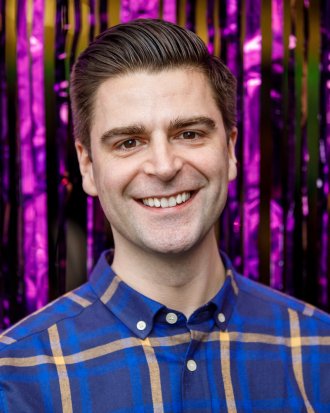
Garry is a Scottish producer and founder of Manchester based Finite Productions. He has produced an array of successful short films which have played around the world and earned accolades including Best British Short Film nominations at both Edinburgh and Leeds International Film Festivals. Garry recently completed Lippy by Lucy Campbell which was picked up by Fox and played on Hulu in the US. In 2016 Garry was selected for Creative England’s Creative Producer Initiative which supported ten emerging producers as they diversified and developed their feature slates. In 2018, he was selected for Edinburgh International Film Festival’s Talent Lab. Garry’s current slate includes: Close to the Edge, a psychological drama to be directed by Eva Sigurdardottir (Cut, Rainbow Party) written by Screen Star of Tomorrow, Justin Trefgarne (Narcopolis); and wry comedy, Home co-written by Richard Johnson and Screen Star of Tomorrow, Richard Fenwick who will also direct.
Garry on challenges and opportunities for LGBTQ+ filmmakers:
There are barriers to stories with the treatment of LGBTQ+ characters both in terms of stereotyping and the need to highlight characters rather than those characters being ‘normalised’ and integrated into stories. I feel that sometimes being in this group has to be the theme or, often, the ‘problem’ of a film. Striking the balance of understanding LGBTQ+ characters and having stories that are simply about these characters is something I don’t feel we have nearly achieved in the film industry. With this in mind, we have a great opportunity to write the future for LGBTQ+ films with lots of uncharted territory. We must break down stereotypes and barriers, disrupting what people expect to hear from our stories, paving the way to more intelligent forms of filmmaking for our LGBTQ+ characters and community.
Garry on an admired filmmaker:
I admire filmmakers who are strong with decisions and who research meticulously to place the audience front and centre in a protagonist’s world. Filmmakers such as the Dardenne brothers, Cristian Mungiu and Darren Aronofsky. Recently, there have been two standout films that I feel inspire this connection with audiences: Foxtrot by Samuel Maoz and GIRL by Lukas Dhont. What struck me about both directorial approaches was the sensitivity and deep routed characterisation of the protagonists. Something that was clearly researched and intensely planned out to strike the emotional beats of each story. They engaged me in their handling of tough subjects alongside kinetic cinematographic style and crafted editing. Stories that transcend boundaries and conventions, paving the way to active conversations whilst moving audiences emotionally is aspirational. For me, these are the foundations of great cinema; putting audiences in someone else’s shoes either for escape, entertainment or to challenge the status quo. I believe these films did all three.
Rhys Marc Jones (writer-director)
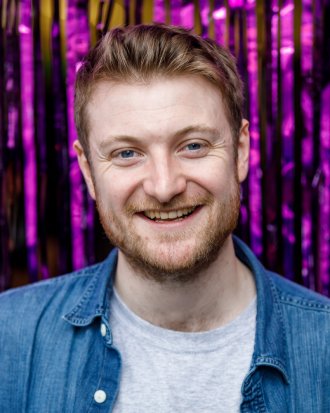
Rhys Jones is a writer and director who was raised in Yorkshire by his Irish and Welsh parents. His interest in film was sparked at an early age when they would record late night movies and withhold them as behavioural incentive. He dropped out of a maths degree at UCL to study cinematography and stop-motion animation at Northern Film School before receiving an MFA in writing/ directing at NYU Tisch School of the Arts as a three-time BAFTA scholarship recipient. His short films Burn Bridge and Boundaries have played festivals including BFI Flare, Leeds, Hamptons, LA, Palm Springs, Toronto InsideOut and his latest short Pale Saint is in post-production. He is interested in making intimate character studies that tackle the struggles of identity, awareness and acceptance.
Rhys on challenges and opportunities for LGBTQ+ filmmakers:
There can be little doubt that LGBTQ+ cinema is enjoying a golden-age in the mainstream following ‘Carol’, ‘Moonlight’ et al. The difficulty for filmmakers going forward may be sustaining and building upon this foothold within the marketplace whilst maintaining the artistic integrity these films managed — by which I mean, creating honest work that stems from the lived queer experience. One of the benefits of LGBTQ+ cinema living on the independent fringes for so long was the filmmakers ability to take bold risks that catered for and spoke directly to their audience. Now gay is ‘in’ and budgets will no doubt increase, will gay filmmakers pander to, or feel the pressures of, audience approval? Or will provocative and subversive work, a staple of the queer film scene for so long, find its way into the mainstream? I believe there will be occurrences of both, and that is a reason to be optimistic. If it becomes possible to sell-out by creating queer content, then it also increases the probability of bolder work seeping through the cracks.
Rhys on an admired filmmaker:
When I was 17, I attended a mandatory career guidance conference consisting of endless rows of nice ladies handing out branded stationary and signing you up to mailing lists. It was tedious but I was looking forward to a newly released film I was seeing later with my brother — for no other reason than the score was by the guitarist from Radiohead and I was a fan. We arrived late for There Will Be Blood but not long after taking my seat I realised that the pile of pamphlets in my bag were now useless and I wanted to direct films. I admire Paul Thomas Anderson’s abilities even more now and have always found his films more rewarding on rewatch, partly due to the compelling characters he creates, then casts perfectly. Also he doesn’t appear to take himself too seriously and I think that’s a good thing for any filmmaker.
Stephen Isaac-Wilson (artist filmmaker and director)
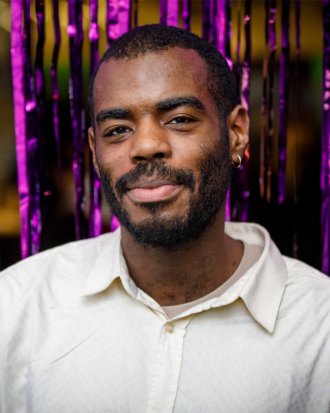
Stephen is a London based filmmaker and artist who has directed films for the Tate, Barbican, Serpentine, Victoria Miro, Channel 4, British Council and Nowness and worked with talent including Zawe Ashton, Mykki Blanco, Isaac Julien, and Sampha. Stephen is able to combine both his journalistic background with his visual art sensibilities, to tell beautifully emotive and thought-provoking stories. As part of the Tate’s Queer British Art 1861-1967 exhibition, he was commissioned to direct an intimate film portrait of a subject he is close to, with the aim of depicting the diversity of LGBTQ experiences in Britain today. In Autumn last year he was commissioned to direct a film for the Barbican’s Modern Couples exhibition. In partnership with the British Council x Boiler Room, and through rare archive, exclusive access and beautiful cinematography, Stephen made a 20 minute stylised documentary that celebrated the 30-year legacy of alternative queer raving in the Manchester. His work has been screened at art institutions including Barbican, ICA, the Tate and screened in competition at BAFTA-qualifying Iris Prize and Oscar-qualifying Leeds festival.
Stephen on challenges and opportunities for LGBTQ+ filmmakers:
LGBTQ+ filmmakers often find themselves marginalised by their inability to access funding, industry resources, and professional support. All these obstacles mean not only is it hard for queer people to sustain careers as filmmakers, but also that queer stories are rarely told by the community. We often find it difficult to be heard or have their ideas taken seriously, often until ‘legitimised’ by a straight person. This means we’re often not properly credited for our concepts and creativity, with our input and work being sometimes even partially or fully erased.
Stephen on an admired filmmaker:
A filmmaker I admire would be Isaac Julien. Citing cultural theorists, exploring humanity and merging genres, his deeply compassionate work refuses to reside in a box. His seminal film ‘Looking for Langston’ chimes chords with me and still feels potently relevant, 30 years on.





